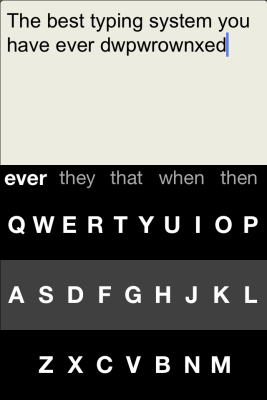San Francisco-based startup Syntellia announced $3 million in Series A funding today, including investment from Highland Capital Partners, Kleiner Perkins Caufield & Byers, Middleland Capital and others. The new funding will help Syntellia drive development of Fleksy, the software keyboard it created that is currently available on Android devices, with expansion via iOS developer partners and to other kinds of gadgets and devices coming soon.
“It’s very easy to adapt our technology to different platforms and different input methods, like the Leap Motion,” explained Syntellia founder and CEO Kosta Eleftheriou in an interview. “All we need to do essentially is take the input and feed it through our algorithm. We take the points, or simulated points of touch and feed it to the algorithm and the rest just follows, because we built the software from the ground up to make it possible to determine where the keyboard was in a user’s mind.”
I’ve actually used Fleksy a number of times and it’s hard to explain Eleftheriou’s vision in action unless you’ve done so as well. It’s actually as simple as typing fast where you think your fingers need to hit on a device screen, using your ingrained muscle memory for QWERTY key positions, and the words just work themselves out. The keyboard has immense potential for use by vision-impaired users, and would likely easily be able to beat record-setting times in mobile device typing competitions, as Eleftheriou says that he can approach world record times without even really trying.
That ability to bridge our existing familiarity with standard hardware keyboards with an input method that makes sense for the future of computing, which isn’t tied to desktop and notebooks, is what attracted investors to Syntellia and Fleksy in the first place. It’s a bet not just on reinventing smartphone communication, but also on powering interfaces ranging from smart appliances to your in-car entertainment, navigation and information system.
In the near-term, there’s still the hurdle of getting Fleksy more presence on iOS, which is hard because Apple doesn’t allow users to switch default features and services like the software keyboard. Fleksy co-founder Ioannis Verdelis says that the company still has confidence that could change, and in the meantime they’re signing up developer partners to incorporate Fleksy into their own apps individually, the first examples of which will roll out soon.
“What Apple seems to do, is that when there’s a real innovation in the platform and compelling reason to open things up, they might do it,” he said. “For the time being, it’s very possible to replace the keyboard when you work with application partners, and it’s worth remembering that when the first Pandora app came out you couldn’t run music apps in the background.”
Fleksy is putting this funding into hires to help it acquire more subject-matter expertise in different categories of connected devices, and in general partnership and market expansion efforts. The company has clear vision, but becoming the next default in a veritable wild west of new connected devices (and other virtual keyboard options) will still be a tough mountain to climb, so more funding and backing from some big name partners definitely can’t hurt.
